The history of coffee in China dates back to the late 19th century when it was introduced by foreign traders and missionaries. Initially seen as an exotic novelty, coffee gradually gained popularity among cosmopolitan circles before spreading its rich aroma across China.
Amidst the bustling streets of China’s vibrant cities, a coffee revolution is brewing, captivating the hearts and palates of millions. The insatiable Chinese appetite for this aromatic beverage has sparked an unprecedented craze that shows no signs of slowing down.
As Chinese consumers develop a discerning taste for quality brews, their preferences have evolved beyond traditional offerings, embracing specialty coffees and unique experiences. Today, we can find stylish cafes boasting modern aesthetics on every corner while local baristas passionately craft intricate latte art with precision. This cultural shift reflects not only a change in beverage preference but also signifies a growing appreciation for Western influences.
In tandem with this remarkable growth story comes an equally exciting opportunity within China’s booming eCommerce landscape. With over a billion internet users and thriving eCommerce platforms dominating online retail sales, coffee eCommerce has emerged as a powerful channel for brands to tap into this burgeoning market effectively.
Overview of the Chinese Coffee Market
Market Size
In recent years, China’s coffee industry has experienced substantial growth. In 2021, the market size reached an impressive ¥381.7 billion, followed by a further increase to ¥485.6 billion in 2022. This growth can attribute to changing public living habits, which have led to the rapid development of the coffee market in China. New brands are emerging at a fast pace, contributing to increased competition within the industry.
This positive trend will continue with an anticipated growth rate of 27.2%, ensuring further expansion of the coffee industry in China. By the end of 2023, the market size is projected to reach approximately ¥617.8 billion.
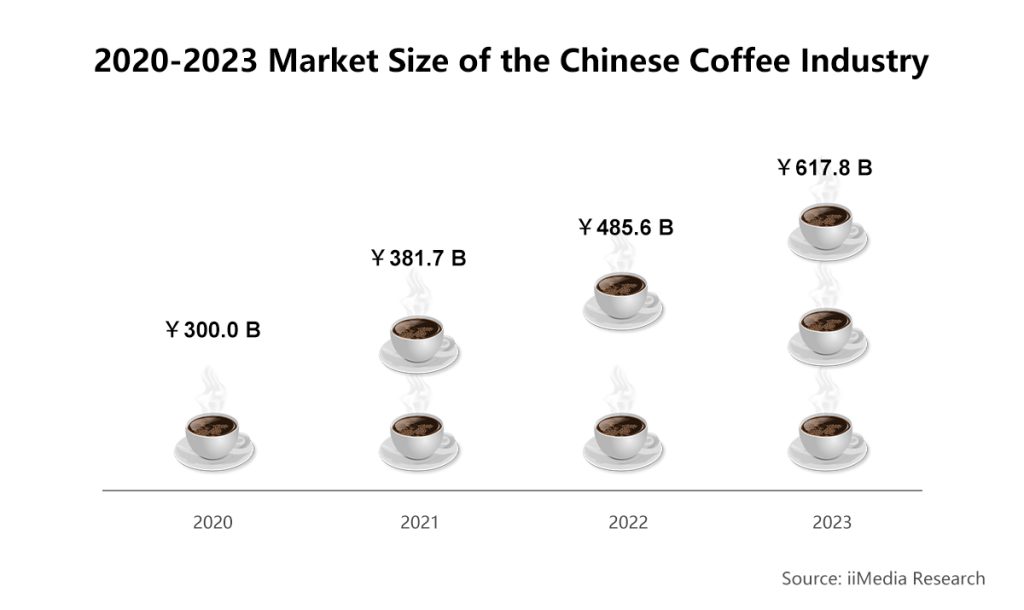
But still, it is essential to note that China’s coffee consumption still lags behind more mature markets like the United States, Brazil, and Japan. In 2022, China’s per capita annual consumption stood at just 11.3 cups, a significant disparity compared to previously mentioned countries where coffee culture is deeply ingrained.
On & Offline Distributions
Over the span of five years (2018-2022), a fascinating trend emerges in China’s coffee market when examining the distribution between on & offline segments. According to Statista, in 2018, brick-and-mortar store establishments dominated 88.4%, while online sales channels accounted for only 11.6%. However, subsequent years witnessed a gradual but significant shift.
By 2019, online presence increased to capture a larger portion at 13.9%, while offline maintained its stronghold at 86.1%. But when the time reached 2022, both sectors found equilibrium: online presence held steady at 20% while offline retained 80%.
The shifting dynamics indicate a clear trajectory towards digitalization within China’s coffee industry as consumers increasingly turn to convenient and seamless online eCommerce platforms for their caffeine fix. Home delivery and mobile ordering have become commonplace in this rapidly evolving market.
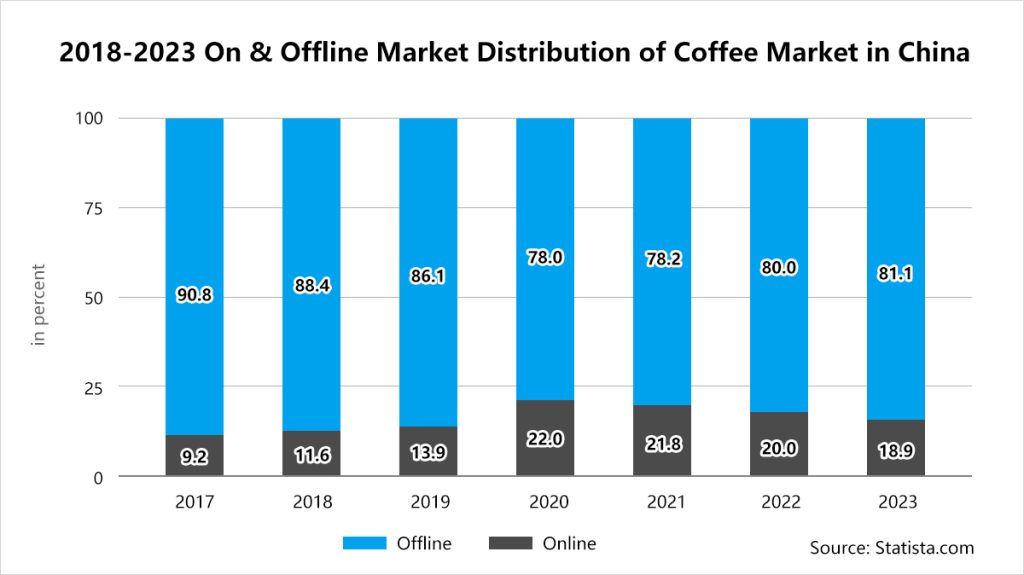
Images for Chinese Coffee Consumers
Age & Gender
The demographics of Chinese coffee consumers are pretty interesting. The primary age groups driving coffee consumption are individuals aged 25-34 and 35-44, constituting significant portions of the total consumer group at 30.2% and 36.2%, respectively. The data indicates that the appeal of coffee extends to young and middle-aged adults who have embraced it as part of their lifestyle.
Furthermore, when examining gender distribution among coffee consumers, females emerge as the stronger force, accounting for 53.1% of the total consumer base, playing a pivotal role in shaping China’s vibrant coffee culture.
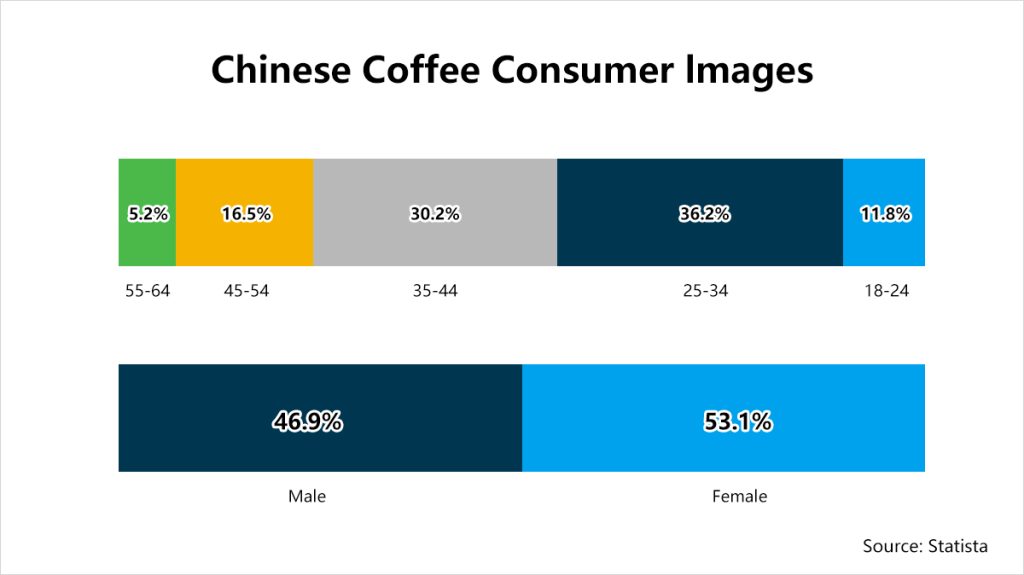
Coffee Preferences
Regarding coffee preferences, most interviewed consumers express a clear preference for purchasing their coffee from dedicated coffee shops. This finding highlights the enduring appeal of the coffee experience, where individuals can savor freshly brewed coffees in an inviting atmosphere.
For alternative options, a considerable portion prefers the convenience and quick preparation offered by instant coffee powder, while others lean towards the ready-to-drink option provided by bottled or hanging coffees. These two groups of consumers are in close competition.
Interestingly, capsule coffee products have garnered relatively less attention among consumers thus far. However, this also suggests ample room for development and growth within this niche segment as consumer awareness continues to expand. The innovative capsules offer individual servings of premium-quality brews, providing potential opportunities for further market penetration.
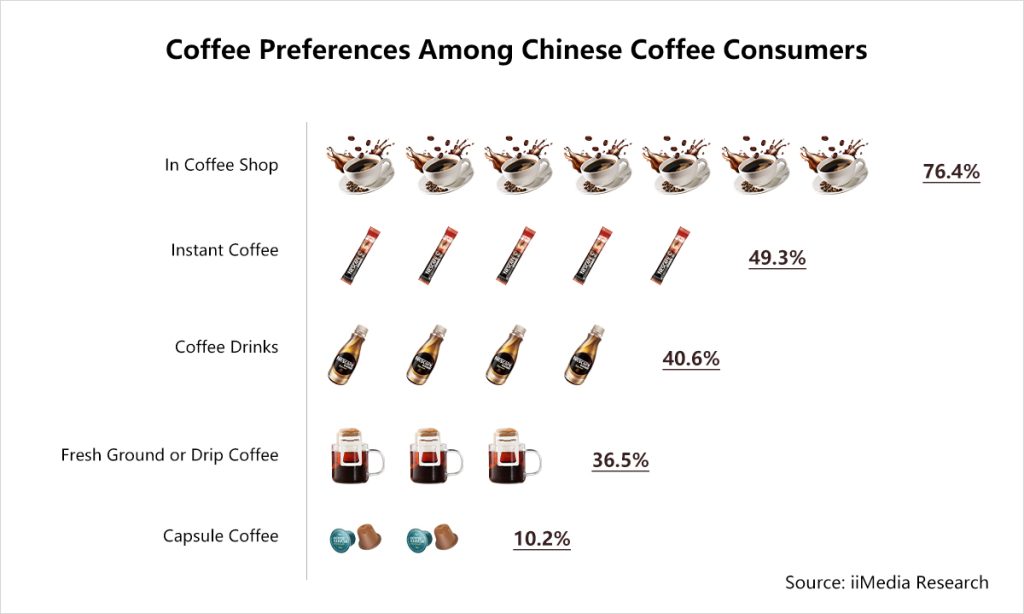
To Pay or Not to Pay for Coffee?
The findings reveal several key factors influencing coffee consumption habits among Chinese consumers. A significant portion of individuals consume coffee as a means to relax or refresh themselves, providing a moment of respite from their daily routines. Additionally, many express a strong affinity for the aroma of coffee, underscoring the importance of sensory appeal in shaping their preference.
Socializing also emerges as an influential factor, with people gathering over cups of coffee during social interactions, further integrating it into China’s social fabric. Moreover, some enjoy coffee during meetings or parties to enhance productivity or simply quench their thirst.
Interestingly, niche groups within the consumer base utilize coffee for specific purposes such as extra nutrition or aiding digestion, and some embrace trends and drink coffee purely due to its popularity – a phenomenon often referred to as “swimming with the tide.”
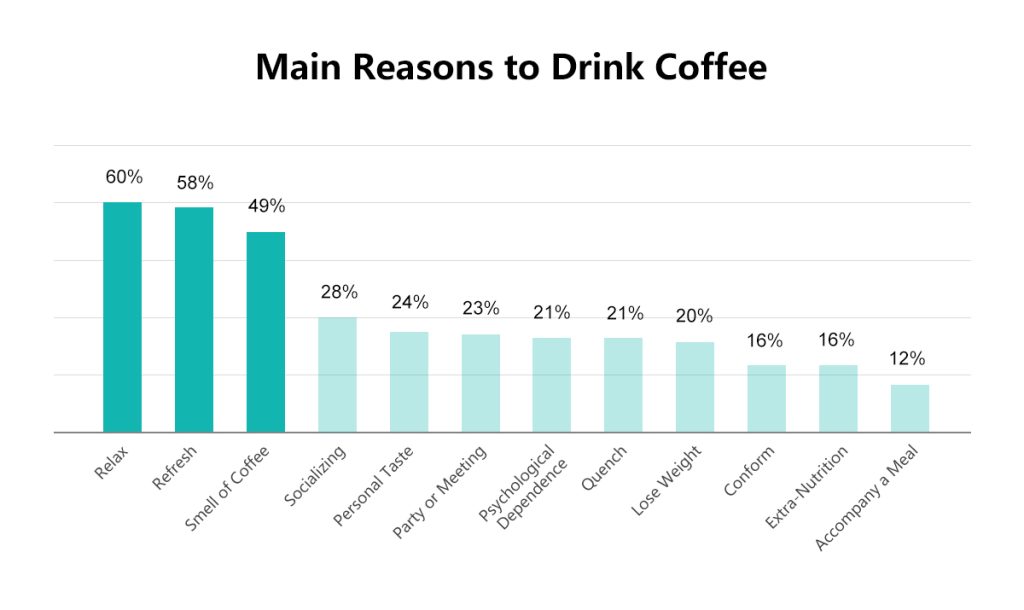
And in the opposite side, the factors influencing the non-purchase of coffee among Chinese consumers are diverse and intriguing. A notable portion perceives no significant benefits to their well-being, questioning the value coffee brings to their bodies. Furthermore, there exists a subset that expresses aversion toward the alluring aroma associated with this beloved drinks.
Some individuals find the expected refreshing effect of coffee underwhelming, prompting them to seek alternative ways to refresh themselves. Cultural traditions and practices also come into play as specific individuals adhere strictly to customs that discourage or prohibit coffee consumption.
Economic considerations add another layer of complexity, with affordability being a critical factor for some who view coffee prices as too high within their budgetary constraints. Moreover, there remains a segment whose lack of familiarity or undisclosed reasons contribute to their decision against purchasing coffee.
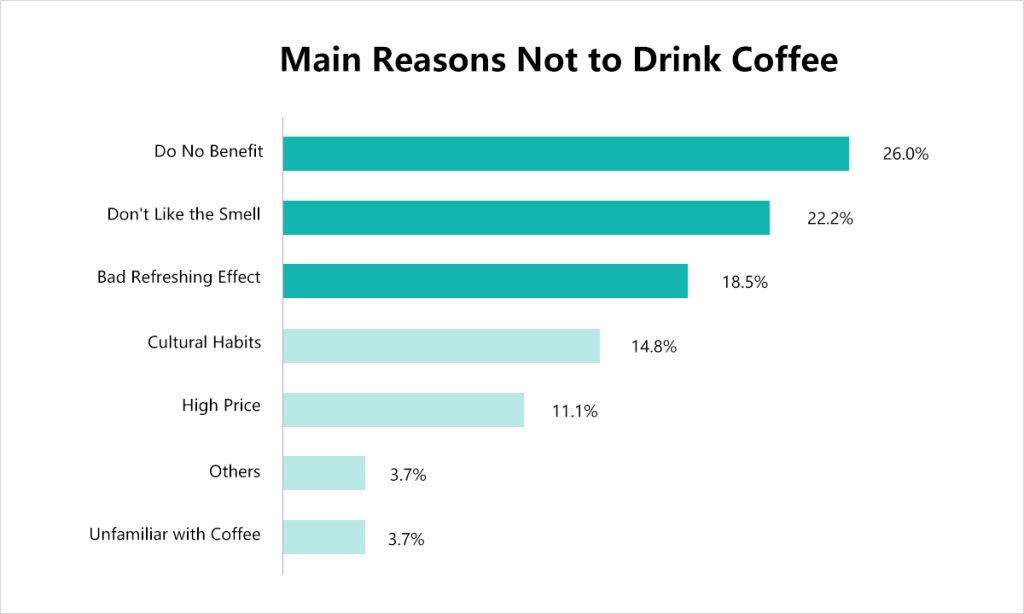
Coffee & Chinese eCommerce
In the dynamic China eCommerce market, where daily visits from millions of users are a norm, tapping into this vast consumer base can yield remarkable results. With an average purchase rate of around 30%, some online stores have even achieved an impressive 50% conversion rate by leveraging optimal customer service and implementing well-designed promotion and visibility campaigns.
eCommerce platforms serve as prime destinations for selling products in China, attracting a significant portion of Chinese consumers who actively seek out novelty they have discovered through social media platforms. By establishing a presence on these online marketplaces, both domestic and overseas brands gain unparalleled visibility within China’s thriving coffee market. However, it is crucial to understand that entering these platforms requires building brand identity and earning a favorable e-reputation beforehand.
Building branding entails cultivating a distinct image that resonates with consumers while highlighting the unique aspects of the coffee offerings. This involves crafting compelling messaging, visually appealing product presentations, and effective storytelling to capture attention amidst fierce competition.

Chinese social media platforms like Douyin (aka Chinese TikTok) and Xiaohongshu (aka RED) have emerged as pivotal platforms for the new generation of Chinese consumers to express their youthful lifestyles. These vibrant platforms facilitate social connections and serve as gateways to the dynamic world of Chinese eCommerce.
In today’s digital age, these online platforms play a crucial role in shaping consumer behavior and driving online shopping trends. With billions of active users, Chinese netizens provide a mighty stage for brands and influencers to effectively showcase products and engage with their target audience.
Amidst the hustle and bustle of China’s first-tier cities, where “the air is filled with the aroma of the coffee,” coffee shops have seamlessly integrated into various aspects of daily life – be it business meetings, fitness sessions, shopping trips, or moments of leisure and entertainment. Coffee has become a shared passion among Chinese consumers.
By analyzing high-frequency words on these influential social media platforms, we discover that terms such as “coffee shop,” “espresso machines,” or “coffee machines for home” have emerged prominently within discussions related to the thriving coffee industry. Moreover, keywords like “daily life” and “KOLs” are frequent in these conversations. The co-occurrence of these keywords suggests that discussions around coffee on social media often revolve around topics like barista training, gourmet food pairing recommendations, or personal experiences at different cafes.
Seamless integration between social media influence and eCommerce combines their strengths that drive heightened consumer engagement while presenting boundless opportunities for businesses seeking to explore the dynamic realm of Chinese eCommerce.
Future Trends of the Chinese Coffee Market
Coffee, a beloved beverage worldwide, continues to thrive as one of the most consumed drinks globally. However, within this dynamic market in China, several notable trends have emerged that are shaping the coffee industry and consumer preferences.
One prominent trend is the surging demand for specialty coffee. Today’s Chinese consumers are increasingly seeking unique and high-quality coffee experiences. They are exploring different flavor profiles, appreciating the artistry and craftsmanship involved in coffee production. The rise of specialty coffee shops and micro-roasters has allowed enthusiasts to discover new flavors and connect with passionate baristas who meticulously source their beans.
Moreover, advancements in brewing methods have further enriched consumers’ relationship with coffee. Alternative techniques, such as capsule coffee or cold brew, have gained popularity due to their ability to provide diverse and personalized experiences. Coffee lovers now enjoy experimenting with various brewing techniques, extraction times, and flavor profiles that enhance their overall enjoyment of this versatile beverage.
Furthermore, there is a notable trend among Chinese coffee consumers toward reducing sugar in their beverages. The demand for sweetness has shifted towards options with less sugar, low sugar, or even no sugar. Brands actively responding to this consumer preference by introducing new products offering 0-calorie sugar, light sugar, and half-sugar choices. These innovations are expected to become standard configurations within the industry.

There has been a decline in demand for non-flavored coffee products such as traditional Americano and latte offerings. However, consumers are increasingly drawn to innovative combinations of classic elements with new ingredients. This situation has resulted in a surge of popularity for new flavors that cater to these evolving preferences – leading brands to accelerate their rate of product launches.
With these trends in mind, specialty experiences highlighting unique flavors, and evolving brewing methods tailored to individual preferences, the future looks bright for both established coffee brands and newcomers aiming to capture the hearts of China coffee enthusiasts.
SENCENT Can Help Promoting Your Coffee Products in China!
As the captivating world of coffee intertwines with the dynamic landscape of Chinese eCommerce, an enticing opportunity awaits brand owners seeking to expand their reach and tap into this thriving market. With a growing demand for quality coffee experiences and a consumer base that is increasingly engaged through social media platforms, China presents an ideal destination for exporting your coffee products.
By leveraging our expertise in navigating the complexities of Chinese eCommerce and marketing strategies tailored to this unique market, we, SENCENT, can help you unlock your brand’s full potential. Contact us today to embark on an exciting journey toward success in China’s vibrant coffee industry. Together, let’s brew greatness and captivate the hearts of Chinese consumers with your exceptional coffee offerings!


